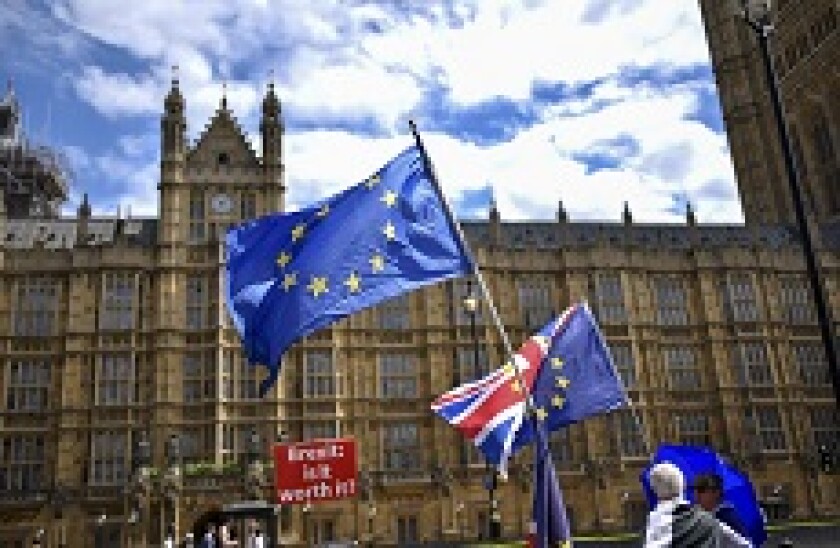The UK’s official negotiating position, as outlined in the UK’s official Brexit white paper and popularly called “the Chequers plan”, cast aside the plan for mutual recognition between the UK and European Union on financial services.
The City had been told that mutual recognition was the government’s official position, but it was replaced in the final plan by a complicated and unpopular alternative which many think is just as likely to be rejected by the EU.
“We have been hearing negative talk from Brussels about the Chequers plan. We are hearing it won’t fly and in terms of financial services we’re very disappointed,” said an executive at a large global bank based in London. “We were led to believe by the Treasury that the government had far greater ambition for financial services and would want to keep aligned with the EU.
“Now we find ourselves being told that things will be divergent and there is a sense that we are being thrown under the bus.”
There was a recognition in the City that mutual recognition, which would have seen UK financial services firms retain much of the same access that they already have to EU markets, was an ambitious negotiating stance.
But while the EU may not have accepted it, the UK government’s opening position — a bid for the complete reform of the EU’s approach to equivalence — is seen as equally unlikely to fly in Brussels and is far less attractive for the UK.
The Financial Times has reported that Michel Barnier, the EU’s chief negotiator, who was initially hostile to the equivalence proposal, might soften his stance if the UK recognises that the EU will have the final say over whether UK firms can access European markets.
But even if Barnier does accept the UK’s model — a situation which would give London the third-country status of Singapore or New York — it is a far inferior option to remaining in the European single market, which Barnier himself affirms has been on offer since the beginning of negotiations.
The EFTA option
The UK could continue to trade with the European Economic Area by becoming the fifth member of the European Free Trade Association (EFTA).
The EFTA model, championed by many Brexiteers before to the referendum, would enable the UK’s financial firms to retain the same market access which they have now.
And having the UK — along with Switzerland, Iceland, Norway and Lichtenstein — as a member of the EFTA would strengthen it, giving it more sway in any future determinations about European services regulation than the UK would enjoy as a third country.
The EFTA also 26 of its own free trade deals agreed with 36 countries, separate from the EU’s, which the UK would be required to be party to.
This would also fix some of the problems with the UK’s and EU’s trade in goods, as the UK could stay a member of EEA regulatory bodies and would not have to impose checks on goods entering the country, meaning there would be no need to stockpile food and medicines.
Critics say this would not satisfy Theresa May’s backbenchers, or some of her own self-imposed red lines, but neither does her Chequers compromise. Many of May’s opponents have been so incensed by her offer to the EU, they are now urging her to pull out of negotiations completely and prepare for a kamikaze Brexit with no deal agreed with the EU at all.
“Our fear is that the chances of a no-deal Brexit are rising rapidly and we don’t know where that puts people,” said the bank executive, “No withdrawal treaty means no transition, no residency rights and no discussion of a future relationship.
“It’s bad, but we can now easily envisage a scenario where this all completely breaks down — especially if the UK puts the withdrawal money back into play. The EU side would respond furiously to that.”
Preparing for a crash
Despite the overwhelming negatives of a no-deal Brexit, the City has been one of the few UK industries which have been preparing for such an outcome, with a number of banks, insurance companies and other UK financial services businesses setting up European subsidiaries in order to continue to serve clients within the EU 27. As they do not have physical products to move across borders this is much easier for service providers. But many of their clients (particularly those in the manufacturing sector) cannot do that and will face supply chain chaos in a no-deal Brexit.
“We can set up infrastructure in the EU — it’s expensive, but it’s possible,” said the bank executive. “For others though things are much more difficult, particularly any business involved in hard manufacturing with supply chains.
“Unless they fully commit to building massive capacity in the EU 27 and having two supply chains, they are going to hit a roadblock. That’s madness and this political inability to agree anything is driving firms and businesses into an impossible situation.”
The executive was highly pessimistic of a compromise being agreed, but said that Brexit was crystallising into the increasingly likely outcome that the UK will leave with no deal at all, which would be a disaster for much of the economy and would likely lead to a slow deterioration of London’s power as a financial services hub.
With so little time remaining before the UK crashes out of the EU without a deal, the government should change tact and push to remain in the EEA by joining the EFTA.
Beginning talks with the EFTA Council and convincing it to accept the UK’s application to join would right the UK government’s wrong of completely ignoring the UK’s financial sector (and all the other service industries) in its Brexit planning, but would also avert the apocalyptic scenarios the government’s own no-deal preparations are pointing towards happening next March.

